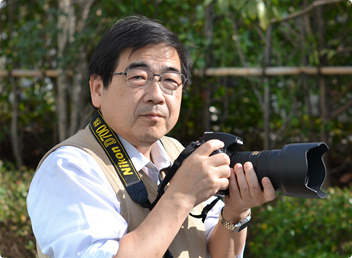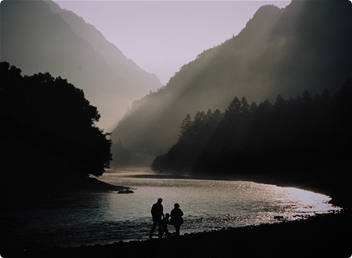A camera is packed with cultures.
Utagawa’s ways of finding ideas.
How do you manage to come up with your ideas?
I don’t have much time in the office to brood over one particular subject. New ideas will not emerge even if I sit at my desk and concentrate. But they may appear unexpectedly when I’m relaxed. Most researchers have had these same experiences, when their innovative ideas have popped up all of a sudden, out of the blue.
How do you relax?
I make it a rule to walk as often as possible. Thinking all the time while anchored to one’s desk may spoil the natural working balance of a brain. This means only a limited area of the brain is used if one is overly focused on logical thinking. One may easily lose the working balance in one’s brain. Walking or similar activities may help recover the overall balance of the brain.
Do you have any other relaxation methods you practice?
Photography is also effective. I have a D700 and many other cameras. I enjoy photography even when I’m away from work. I have a long-held dream to take a picture that resembles sumi-e or ink-and-wash painting. I have not yet achieved this quality that I aim to attain. Fortunately, this is no place for my expertise, as it has nothing to do with optical technology. But I am resolved to keep practicing and hone my artistic sensitivity. I know there is still a long way to go. (Laughs)


A photograph taken by Mr. Utagawa.
Optics is fun to study. Cameras are fun to play with.
You have liked cameras for many years, haven’t you?
Yes, I have. I’ve liked cameras, or I might rather say I’ve liked optics, since my childhood.
Really? You liked optics since even when you were still a child?
In my childhood, I found a store selling lens kits. I used a kit that I bought to make a telescope, by shaping cardboard into a tube, and placing a lens, a mirror and a smoked glass in it. It made a nice reflecting telescope.
So it was optical gadgets that you played with in your childhood.
Yes, it was, although it may sound a little bit exaggerated. In my fifth grade at primary school, I was bought a 500-yen toy camera. I enjoyed playing with it. In this sense, I have a long history of companionship with a camera. Of course, I already knew the name Nikon, even at that age.
You have been deeply involved in developing new cameras at a revolutionary time for photography. What is it that keeps you continually attracted to cameras?
There’s no more attractive product than a camera in the whole industrial world. Sometimes, a camera is referred to as an industrial exhibition of the nation that made it, where all its cutting-edge technologies are displayed. In addition to technology, cameras can also be regarded as objects of craftsmanship, being actively dealt with in the used-product markets. A lens gives you a sense of fun to see and touch it. Before, during and after photography, one experiences various kinds of enjoyment. Cameras stimulate human sensitivity and creativity. The personalities of users are represented in their ways of photography and enjoyment, as is the culture of a nation. Once it is considered as a collection of multilateral cultures, this perspective starts to shed quite a new light on a camera.
I am very impressed to hear you talk so happily about cameras.
I have been engaged in the development of new cameras for a long time, which has enabled me to more deeply experience the fun and pleasure of a camera. It is important for a researcher to find out to what degree one can feel attraction towards a subject of study and hold a true interest in it. I am happy, as my subject of interest and study is a camera. I am very pleased to be here and to continue exploring the possibilities of cameras for tomorrow.
